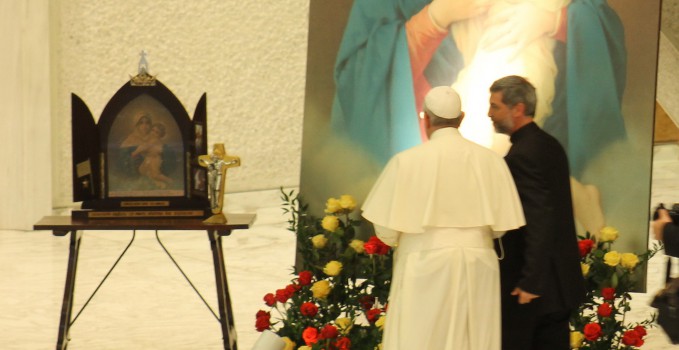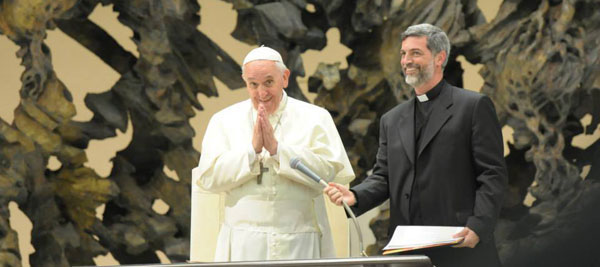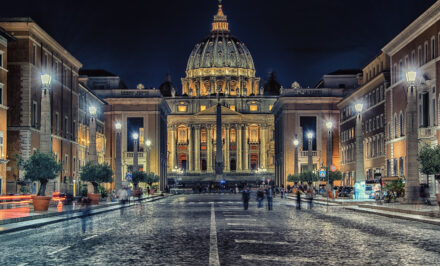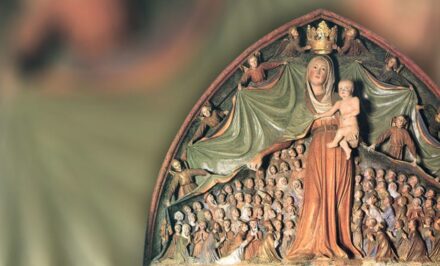Fr. Alexandre Awi, Brazil •
Neither “conservative” nor “progressive.” Simply Church. There are “conservatives” and “progressives” among all of us, and these types also exist in the Church. Fortunately, the rich plurality of opinions and tendencies within the Church also finds a home within our Movement. We don’t find either Liberation Theology or the Mass in Latin detestable, because the Church also doesn’t. Whoever thinks it does should become more familiar with the official positions of the Church. There are people in our Movement who are sympathetic to Liberation Theology and there are people who sympathise with the Mass in Latin, to cite just a few examples of what is normally seen with the respective titles of “progressive” or “conservative.” If something is legitimately welcomed in the Church, it can also be welcomed within the Schoenstatt Apostolic Movement. We are neither on the left or the right, nor even at the centre. We belong to the Church and this does not have partisan positions. In social terms, our banner is the Social Doctrine of the Church. In liturgical terms, the guiding principles of the Congregation for Divine Worship and the Discipline of the Sacraments. And in our pastoral work, we allow ourselves to be guided by the Brazilian Bishops’ Conference (CNBB), the legitimate representative of the college bishops in Brazil.
Sometimes people who are more “conservative” (or more to the “right”) give the impression that they are only concerned with sexual morality and life issues (abortion, gender ideologies, euthanasia, marriage and family, etc) and that the more “progressive” (or more to the “left”) concern themselves with the topics of social morality (poverty, ecology, workers’ rights, protection of the marginalised, etc). The Church, on the other hand, concerns itself with both these realities because it recognizes that one is not more important than the other. It would be incoherent for a Christian to fight against abortion but to defend the death penalty; or fight for the environment but support gender ideology! We observe Pope Francis’ posture, for example, where he releases an “ecological encyclical,” condemns the financial system playing itself out in society, but also opposes abortion and gender ideology! Sexual immorality is not greater than the social immorality in which we live, or vice versa. Even though many people think so. Let us observe also our founder who, for example, denounced both a “unisex culture” (which reduces the individual characteristics of man and woman) as well as “social injustice” (condemning both savage capitalism as well as Marxism, which he called bolshevism).
Jesus Christ also has a message of salvation and joy for all of man’s life situations, both in the personal and community spheres. This is why the CNBB, for example, recently released an official statement both against gender ideology (which might appear “conservative”) and the reduction of the age of criminal responsibility (which might appear “progressive”). The Church, thank God, does not allow itself to label or frame these categories! Its only loyalty should be to Jesus Christ and not to political or partisan ideologies.
The Schoenstatt Movement must reflect, therefore, on both issues of sexual morality and social morality. It should choose, pray and fight for a more Christian position! The “I feel” position is not enough! (“I feel this…” or “I feel that…”) The question is: “What does Jesus feel?” Practical faith in Divine Providence – part of Schoenstatt’s spirituality – teaches us to always ask: what is God’s will on this issue? What would Jesus, the Blessed Mother, or our father and founder do if he had to take a position on this issue? And in order to assist this reflection, we need to listen to the voice of the Church.
After all, we believe that the Church has the special assistance of the Holy Spirit. Even more so, when it expresses itself collegially: in a council, a Bishops’ Conference or in the person of the Pope (who speaks as the head of the college of bishops). Recent proof of this is the examples already mentioned in the statements released by the CNBB. I sincerely have no doubt that if they allowed Jesus to provide legislation in Brazil, he would be opposed both to gender ideology as well as the reduction in the age of criminal responsibility! I thank our bishops for enlightening us in such a correct manner. Independently of the partial results of the vote, this continues to be the position of the Church. I suppose that Christians who think differently have enough reasons to justify their position before Christ. They may think differently but let them do so with the full conviction that it is really the Holy Spirit that is inspiring them!
In fact, people in their individual capacity might not be in agreement with some of the Church’s guidance, either in the social, doctrinal, liturgical or pastoral domains (as long as it does not involve a dogma of the faith). Freedom of conscience is also part of the Church’s doctrine. And this also holds true for those who occupy positions of leadership within our Work.
In Schoenstatt, we greatly value freedom. True freedom of conscience and of expression should accompanied, however, by the appropriate formation of our conscience. Therefore, beyond the search for true knowledge in the scientific, political, economic, and social spheres, we allow ourselves to be enlightened decisively by the position of the Church. In particular, our leaders need to think about this before posting their opinions on social networks, because often, the position of a leader is seen, particularly by the people they accompany, as the opinion of the Movement and the Church! This does not mean we are “sitting on the fence,” as some might say. We remain within the fence! Within the fence of the Church.
And the reason for this attitude is simple: faithfulness to our father and founder. After all, Fr. Kentenich, even when he was misunderstood and persecuted by the Church itself, he always followed its directives and asked that only one phrase be inscribed on his tomb: “Dilexit Ecclesiam” (He loved the Church). As a summary of his life, this also continues to be the attitude of his sons and daughters. Our founder, for example, closely accompanied the Second Vatican Council. He was also aware that, in some aspects, our charism had preceded the Council. He fully welcomed its decisions and promised Pope Paul VI that Schoenstatt would help receive and plant the outcomes of Vatican II in the life of the Church. And today, we, his children, do not want to act differently!
“Father with you” is the first part of the motto for the Schoenstatt Family for this year. Also in the social, political and ideological questions that flood our times, we also repeat: “Father with you, we love the Church!”
Source: www. maeperegrina.org.br















